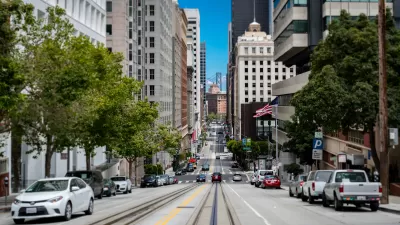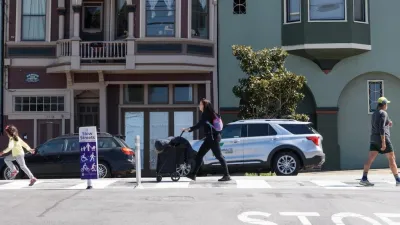A June 16 vote by the San Francisco MTA to improve safety will allow taxis, along with bicycles and Muni buses, but not ride-hailing services to make turns onto the downtown's main thoroughfare, Market Street, has upset San Francisco-based Uber.

"The San Francisco Municipal Transportation Agency (MTA) Board of Directors unanimously approved a series of simple changes designed to reduce the number of collisions and speed transit travel on the city’s busy main boulevard," reports Michael Cabanatuan of the San Francisco Chronicle. Italics added, as those "simple changes" have greatly upset the hometown ride service giant, Uber.
The turning prohibitions onto Market between Eighth and Third streets are part of a plan known as Safer Market Street intended to help the city achieve its Vision Zero goal of zero deaths by 2024.
“The only way to drastically reduce the number of collisions is to drastically reduce the number of vehicles,” said Tom Maguire, the agency’s director of Sustainable Streets. “That’s the purpose of this project. It is not about taxi regulations. It is not about Uber.”
While primarily a safety measure for pedestrians and cyclists, the plan is also intended to speed transit service on Market Street that carries a mix of buses and streetcars. See Mass Transit article.
Under the plan, drivers will be unable to turn onto Market Street between Eighth and Third streets...Uber officials objected to the plan because it would allow taxis on Market Street — and in the transit-only lanes — while ride services such as Uber and Lyft would have to abide by the turning restrictions like all other private vehicles.
The vote pleased the editor of Beyond Chronicle, Randy Shaw, who editorialized prior to the vote:
A vote in favor of car restrictions continues the remarkable progress Mid-Market has made since Twitter moved to the area; by increasing pedestrian and bicycle safety and making sidewalk dining more desirable, it is a vital step in Mid-Market’s positive transformation.
"Nearly three hours of public comments — almost all of them in support of the plan — preceded the board’s unanimous vote," writes Cabanatuan. "Supporters of transit, bicycling and walking all spoke up for the plan, saying it would make Market Street safer. Taxi drivers, eager for a leg up on the ride services, also cheered the plan, and jeered Uber."
Representatives from Uber, as one would expect, were not happy at seeing their Market Street access "disrupted."
“If eliminating right turns is making Market Street safer, then all vehicles should be banned from making right turns,” said Wayne Ting, Uber’s San Francisco general manager, who alleged taxis were being given preferential treatment.
However, the exception given to taxis is consistent with others the industry enjoys, such as the ability to use the new red transit lanes.
FULL STORY: Market Street will strictly limit vehicles, despite Uber outcry

Planetizen Federal Action Tracker
A weekly monitor of how Trump’s orders and actions are impacting planners and planning in America.

Maui's Vacation Rental Debate Turns Ugly
Verbal attacks, misinformation campaigns and fistfights plague a high-stakes debate to convert thousands of vacation rentals into long-term housing.

San Francisco Suspends Traffic Calming Amidst Record Deaths
Citing “a challenging fiscal landscape,” the city will cease the program on the heels of 42 traffic deaths, including 24 pedestrians.

Amtrak Rolls Out New Orleans to Alabama “Mardi Gras” Train
The new service will operate morning and evening departures between Mobile and New Orleans.

The Subversive Car-Free Guide to Trump's Great American Road Trip
Car-free ways to access Chicagoland’s best tourist attractions.

San Antonio and Austin are Fusing Into one Massive Megaregion
The region spanning the two central Texas cities is growing fast, posing challenges for local infrastructure and water supplies.
Urban Design for Planners 1: Software Tools
This six-course series explores essential urban design concepts using open source software and equips planners with the tools they need to participate fully in the urban design process.
Planning for Universal Design
Learn the tools for implementing Universal Design in planning regulations.
Heyer Gruel & Associates PA
JM Goldson LLC
Custer County Colorado
City of Camden Redevelopment Agency
City of Astoria
Transportation Research & Education Center (TREC) at Portland State University
Jefferson Parish Government
Camden Redevelopment Agency
City of Claremont




























